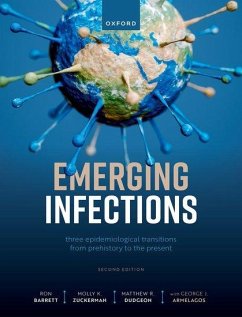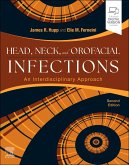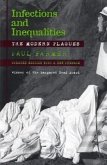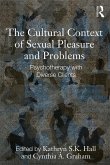Prof Ron Barrett (Associate Professor, Associate Professor, Departm, Dr Molly Zuckerman (Assistant Professor, Assistant Professor, Depar, Dr Matthew Ryan Dudgeon (Assistant Professor, Assistant Professor,
Emerging Infections
Three Epidemiological Transitions from Prehistory to the Present
Prof Ron Barrett (Associate Professor, Associate Professor, Departm, Dr Molly Zuckerman (Assistant Professor, Assistant Professor, Depar, Dr Matthew Ryan Dudgeon (Assistant Professor, Assistant Professor,
Emerging Infections
Three Epidemiological Transitions from Prehistory to the Present
- Broschiertes Buch
- Merkliste
- Auf die Merkliste
- Bewerten Bewerten
- Teilen
- Produkt teilen
- Produkterinnerung
- Produkterinnerung
This accessible textbook provides the first comprehensive synthesis of both the societal and environmental drivers of emerging infectious disease in humans, from prehistory to the present day. It discusses the applications of these ideas for global health policies and future research.
Andere Kunden interessierten sich auch für
![Fungal Infections of the Nail and Scalp Fungal Infections of the Nail and Scalp]() Fungal Infections of the Nail and Scalp97,99 €
Fungal Infections of the Nail and Scalp97,99 €![Infections in Older Adults, an Issue of Infectious Disease Clinics of North America Infections in Older Adults, an Issue of Infectious Disease Clinics of North America]() Infections in Older Adults, an Issue of Infectious Disease Clinics of North America126,99 €
Infections in Older Adults, an Issue of Infectious Disease Clinics of North America126,99 €![Head, Neck, and Orofacial Infections Head, Neck, and Orofacial Infections]() Head, Neck, and Orofacial Infections135,99 €
Head, Neck, and Orofacial Infections135,99 €![Cranial and Spinal Tuberculosis Infections including Acute Presentations Cranial and Spinal Tuberculosis Infections including Acute Presentations]() Veekshith Shetty (Bangalore Manipal Hospital)Cranial and Spinal Tuberculosis Infections including Acute Presentations22,99 €
Veekshith Shetty (Bangalore Manipal Hospital)Cranial and Spinal Tuberculosis Infections including Acute Presentations22,99 €![Infections and Inequalities Infections and Inequalities]() Paul FarmerInfections and Inequalities34,99 €
Paul FarmerInfections and Inequalities34,99 €![Handbook of Fungal Infections Handbook of Fungal Infections]() Kiran V GodseHandbook of Fungal Infections37,99 €
Kiran V GodseHandbook of Fungal Infections37,99 €![The Cultural Context of Sexual Pleasure and Problems The Cultural Context of Sexual Pleasure and Problems]() The Cultural Context of Sexual Pleasure and Problems74,99 €
The Cultural Context of Sexual Pleasure and Problems74,99 €-
-
-
This accessible textbook provides the first comprehensive synthesis of both the societal and environmental drivers of emerging infectious disease in humans, from prehistory to the present day. It discusses the applications of these ideas for global health policies and future research.
Hinweis: Dieser Artikel kann nur an eine deutsche Lieferadresse ausgeliefert werden.
Hinweis: Dieser Artikel kann nur an eine deutsche Lieferadresse ausgeliefert werden.
Produktdetails
- Produktdetails
- Verlag: Oxford University Press
- 2 Revised edition
- Seitenzahl: 192
- Erscheinungstermin: 28. März 2024
- Englisch
- Abmessung: 189mm x 247mm x 15mm
- Gewicht: 420g
- ISBN-13: 9780192843142
- ISBN-10: 0192843141
- Artikelnr.: 63730446
- Herstellerkennzeichnung
- Libri GmbH
- Europaallee 1
- 36244 Bad Hersfeld
- gpsr@libri.de
- Verlag: Oxford University Press
- 2 Revised edition
- Seitenzahl: 192
- Erscheinungstermin: 28. März 2024
- Englisch
- Abmessung: 189mm x 247mm x 15mm
- Gewicht: 420g
- ISBN-13: 9780192843142
- ISBN-10: 0192843141
- Artikelnr.: 63730446
- Herstellerkennzeichnung
- Libri GmbH
- Europaallee 1
- 36244 Bad Hersfeld
- gpsr@libri.de
Ron Barrett is an Assistant Professor of Medical Anthropology at Macalester College. His research concerns the social aspects of infectious diseases, with an ethnographic focus on northern and western India. His work on the biosocial aspects of leprosy and other socially stigmatized diseases can be found in, Aghor Medicine: Pollution, Death, ad Healing in Northern India (University of California Press), which was recently awarded the Wellcome Medal for Medical Anthropology by the Royal Anthropological Institute. His currently the primary investigator for an NSF-sponsored research on the relationship between social support networks and health-seeking for influenza-like illnesses in a western Indian slum community. Professor Barrett is co-editor of a textbook reader, Understanding and Applying Medical Anthropology (McGraw Hill). He is also a registered nurse with clinical experience in hospice, neuro-intensive care, and brain injury rehabilitation. Molly Zuckerman is a Professor in the Department of Anthropology and Middle Eastern Cultures (AMEC) at Mississippi State University. Her research interests include Bioarchaeology, Paleopathology, Paleoepidemiology, and Biocultural Anthropology. Within these domains, she is broadly interested in the biosocial determinants of health inequalities and disease experiences within past populations. She is a Senior Editor of the Oxford Research Encyclopedia of Anthropology, published by Oxford University Press. Matt Dudgeon is an Assistant Professor of Medicine in the Emory School of Medicine and Associated Assistant Professor in the Department of Anthropology at Emory University. His research has focused on the intersection of health and culture. He currently participates in research on determinants of antiretroviral failure in South Africa, a cross-national comparison of determinants of vaccine acceptance, internal medicine resident simulation training, and hospital-based ethnography of healthcare provider experiences during the COVID-19 pandemic. The late George J. Armelagos was Goodrich C. White Professor of Anthropology at Emory University. His research interests concerned the paleopathology and evolution of diet and disease in prehistoric human populations. His research has involved the osteological and pathological analysis of mummified and skeletal populations from North Africa and North America, tracing health changes associated with the Neolithic transition to sedentism and agriculture. He has also published osteopathic and phylogenetic evidence in support of the New World origin of syphilis. Professor Armelagos is the former president of the American Association of Physical Anthropologists (AAPA). He is a recipient of the Franz Boas Award (American Anthropological Association), the Charles Darwin Award (AAPA), and the Viking Medal (Wenner Gren Foundation).
1: Introduction
The First Transition
2: The Paleolithic Baseline
3: Agriculture and the First Emerging Infections
The Second Transition
4: When Germ Theory Didn't Matter
5: The Worst of Both Worlds
The Third Transition
6: Converging Infections
7: Inevitable Resistance
8: Conclusion
The First Transition
2: The Paleolithic Baseline
3: Agriculture and the First Emerging Infections
The Second Transition
4: When Germ Theory Didn't Matter
5: The Worst of Both Worlds
The Third Transition
6: Converging Infections
7: Inevitable Resistance
8: Conclusion
1: Introduction
The First Transition
2: The Paleolithic Baseline
3: Agriculture and the First Emerging Infections
The Second Transition
4: When Germ Theory Didn't Matter
5: The Worst of Both Worlds
The Third Transition
6: Converging Infections
7: Inevitable Resistance
8: Conclusion
The First Transition
2: The Paleolithic Baseline
3: Agriculture and the First Emerging Infections
The Second Transition
4: When Germ Theory Didn't Matter
5: The Worst of Both Worlds
The Third Transition
6: Converging Infections
7: Inevitable Resistance
8: Conclusion








